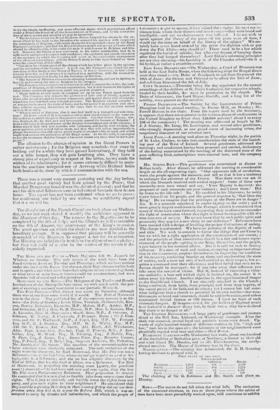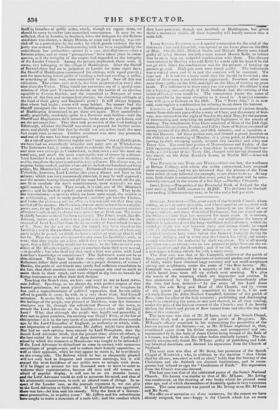Rows.—The waves do not fall when the wind lulls. The
excitation of the contested elections, in two or three places where the spirits of men have been most powerfully worked upon, still continues to exhibit
itself in breaches of public order, which, though we regret them, we should be sorry to cocker into unmerited consequence. It may be re.
collected, that at Lauder, in Scotland, when the delegate for the Reform candidate was chosen, a dainty Deacon, or some such worthy, was car- ried off in a post-chaise by the mob ; by which gentle violence the ma- jarity was secured. This electioneering trick lies been magnified by the subordinate law authorities—almost to a max Anti-Ref enters—into a heinous crime, and as many "precognition" have taken place in conse- quence, as if the integrity of the empire had depended on the integrity of the Lauder Council. Among the persons implicated, there were, it seems, two belonging to the village of Haddington. After the Sheriff of Berwickshire had sat in judgment in Lauder for some eight days, the Sheriff of Haddington commenced his sittings, with equal gravity;
and the men being found guilty of hustling a lord and stealing a tailor,
est something of that sort, were committed to gaol. Now all this was ridiculous. The crime, such as it is, lies been perpetrated at every elec-
tion since the Union. What would our townsmen say of a special com- mission of Oyer and Terminer to decide on the merits of an election squabble in Covent Garden, and the committal to Newgate of some
twenty of the free and independent electors, for showering cabbages at the head of their glory and England's pride ? It will always happen, that where bad begins, worse will come behind. No sooner had the .Sheriff consigned the two rioters to Haddington gaol, than the people ef Haddington determined to get them out again. They assembled- voolly, peacefully, resolutely, quite in a Porteous mob fashion—told the • Steriffund Magistrates their intentions, broke open the gaol-doors, and set the prisoners free. They then took possession of the road leading to Ellinburgh, whither the Sheriff was about to proceed for further assist- ance, and plainly told him that he should not stir a foot until the men had ample time to escape. Farther assistance was next day procured, and one of the men has been recaptured.
As a set-off against thisvery regular and " cannie" riot at Haddington, we have had an exceedingly irregular and noisy one at Whitehaven.
The Reformers had, it seems, a mind to celebrate the King's birth-day, and their own triumph in Cumberland, in that town ; and the most na- me] way, and numb the most cundietahle, was of course by a dinner.
lord Lowther had a mind to console his defeat, on the Sallie occasion; and he, too, chose the most cornfortahle way, a dinner. His dinner was, we suppose, better cooked, and his wines older—he had one hundred and forty
vents, Mr. Blamire had only seventy. Hitherto all was straightforward.
Unluckily, however, Lord Lowther also gave a dinner and beer to his seinen; which was very numerously attended, it. may be well supposed ;
and the miners having discussed all the roast beef and drank all the ale, saw fit to conclude the day's entertainment, most naturally, we may rain remark, by a row. They struck, it is said, one of Mr. Blamire's
guests ; and he fetched a poker; and struck them in turn. They broke
t he inn-windows,— a sport to which we know none equal, the crackle is SO exhilarating, and so easily produced ; and they got into the kitchen, and broke the plates—a serious ofr,,,,,,; it is not said whether they also
carried off the mutton. On the whole, tile row seems to have been a mighty panty row, Our an English row ; and lied t are been a competent number of broken Leads, it mieht almost have served for an Irish one. We notice
it chiefly because so much has loam mode (die The Times, whirls, like Dr. Johnson, treats every subject in a grind way, has been canine for the
removal of Lord Leveller from the Li:seen:limy of Cundyerlitzei bceanse
of it. Now, we do not see that the tumult lice lie;Rt traced to his Lordship ; and in the excellent charaeter of dint nobleman, of whom any
party might he proud, we think we have a sueleicut warrant that it will
not be. That the men into wised the riot were his Lordship's serfs, is Erne; that they might get a hint, which they were expected to improve
upon, that a little hooting would not be amiss, in the lofty-minded cnt-
elision of Mr. Blemire's party,—just to convince them they were mortal, —is possible ; but who shall say that such a hint was given with Lord Lewther's knowledge or concurrence ? The Reformers must not lie so thin-skinned. They have had their riots—why should not the Anti- Reformers follow their good example,—at a proper distance, of course ? Besides, the pride of our friends may surely find sufficient consolation in the fact, that their enemies were unable to engage one soul on earth to assist them in their attack, and were obliged to dig into its bowels for Stung instruments to effect their dark designs.
Touching the Scotch riots, we have one word to say to Lord Advo- cate Jeffrey. Speaking, as we always do, with perfect respect of that learned gentleman, we must plainly tell him, that if he imagines he Itas such a superabundance of political reputation that he can safely afford to gamble it away, be will, in a very short time, find himself mistaken. It seems that, when an election procession, honourable to the feelings of the people, was planned at Aberdeen, some few timorous ureatures saw fit, through the self-elected Provost of the town, to consult the Lord Advocate on its legality ;—and what said the legal Lord ? Why, that although the people met legally and peaceably, if they met in great numbers, the meeting was illegal ! First, of the law of 'this' opinion—it is in the very teeth elan opinion given not three months ago by the Lord Chancellor of England, an authority to which, with- out imputation of undue submission, Mr. Jeffrey might have deferred. Thst had no such opinion been tittered by Lord Brougham, does the Scotch Lord Advocate think, that the present time, above all others, is the best suited for the revival of those doctrines of the Castlereagh
school by which the massacre at Manchester was sought to be defended ?
If the Lord Advocate be disinclined to come in contact with numerous assemblages of people,—aye, and to endure their homely opposition, as well as their applause, when he may appear to merit it, he is evidently
en the wrong side. The Reform which he has so eloquently pleaded will not only lead to frequent and numerous meetings, but it will compel the most fastidious of our public men to mingle with them. If it be illegal at present for ten thousand. men to meet in order to welcome their representative, because old men and old women are afraid of popular display, it will not be so six months hence; and the Lord Advocate would do well to accustom his mind, and that of his aristocratic countrymen, to such an altered state of things. In re- spect of the Lauder case, as the journals represent it, we can give Ito the Lord Advocate as little credit. If Lord Maitland was aggrieved, there was law—let him seek his remedy. Why the farce of a Govern- anent prosecution, in so paltry a case ? Mr. Jeffrey and his subordinates have sought to make a mountain of a mole-hill ; and the conduct which
they have provoked, though not justified, at Haddington, has given them a mouetain which all their ingenuity will hardly convert into a
mole-hill.



























 Previous page
Previous page